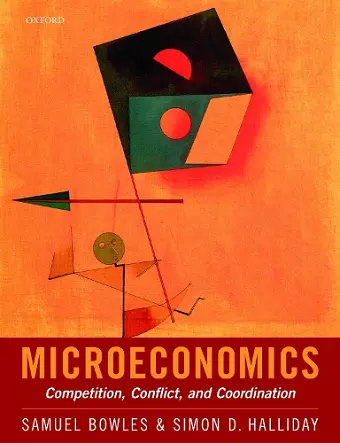Microeconomics
Competition, Conflict, and Coordination
Samuel Bowles author Simon D Halliday author
Format:Paperback
Publisher:Oxford University Press
Published:29th Jul '22
Should be back in stock very soon

Bowles and Halliday capture the intellectual excitement, analytical precision, and policy relevance of the new microeconomics that has emerged over the past decades. Drawing on themes of the classical economists from Smith through Marx and 20th century writers - including Hayek, Coase, and Arrow - the authors use twenty-first century analytical methods to address enduring challenges in economics. The subtitle of the work - Competition, conflict, and coordination - signals their focus on how the institutions of a modern capitalist economy work, introducing students to recent developments in the microeconomics of credit and labor markets with asymmetric information, a dynamic analysis of how firms compete going beyond price taking, as well as bargaining over the gains from exchange, social norms, and the exercise of power. The new benchmark model proposed by Bowles and Halliday is based on an empirical approach to economic actors and problems. They start from the premise that contracts are incomplete, and that as a result market failures, rather than being a special case illustrated by environmental spillovers, are to be expected in markets for labor, credit, knowledge and throughout the economy. They explain how experiments show that human motivations include ethical as well as other-regarding preferences (rather than entirely self-interested) and explain why the technologies of knowledge-based economies are a source of winner-take-all rather than stable competition. The authors also consider the intrinsic limits of mechanism design and governmental interventions in the economy. Teaching recent developments in microeconomic theory allows the authors to provide students with the tools to analyze and engage in informed debate on the issues that concern them most: climate change, inequality, innovation, and epidemic spread. Tradeoffs are highlighted by providing models in which capitalism can be seen as an "innovation machine" that raises material living standards on average, while at the same time sustaining levels of inequality that many find to be unfair. Digital formats and resources This title is available for students and institutions to purchase in a variety of formats and is supported by online resources. The e-book offers a mobile experience and convenient access along with self-assessment activities, video content, and links that offer extra learning support. For more information visit: www.oxfordtextbooks.co.uk/ebooks/ Drawing on the authors' decades of teaching the new microeconomics, this title...
I envy the students who will have the opportunity to take a microeconomics course based on this brilliant textbook. Not only will they find it fascinating. It will change their lives, in every way, for the better. * George Akerlof, Georgetown University, Nobel Laureate in Economics *
In a thick wall of textbooks about rational agents trading in perfect markets, Bowles and Halliday open up a window through which students can see economists at work as they seek answers to market failures, behavioral biases and all the obstacles that must be overcome to build a society that is fair and efficient. This book can change how economics is understood by students who will go on to help us find the answers. * Oriana Bandiera, Sir Anthony Atkinson Professor of Economics, LSE, Winner of the Yrjö Jahnsson Award *
This text will make for an exciting course - and one especially relevant to contemporary problems like inequality and climate change. Normally, students don't see recent economic ideas until they reach the end of the book. Here such ideas are introduced starting in the first chapter. * Eric Maskin, Harvard University, Nobel Laureate in Economics *
Bowles' and Halliday's textbook unusually puts at its core the key concepts of social sciences: the interactions (competition, conflict, and coordination) among individuals, groups, and firms. You will come away from this riveting reading understanding how economists deploy theory to help design impactful public policies, and why economics is essential to making this world a better place. * Jean Tirole, Toulouse School of Economics, Nobel Laureate in Economics *
Ambitious and exciting! The authors propose a completely new problem-centred approach to teaching microeconomics which gives space to discussion of issues often ignored by undergraduate microeconomics textbooks. * Dr Marco Pelliccia, Associate Professor in Economics, Heriot-Watt University *
The key strength of the content is the refreshing, big-picture way in which the concepts are presented, as well as the care in carrying out the real-world examples used to illustrate the arguments. * Dr Daniele Tavani, Associate Professor, Colorado State University *
ISBN: 9780198843207
Dimensions: 246mm x 190mm x 35mm
Weight: 1778g
1068 pages